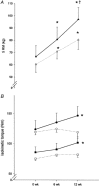Timing of postexercise protein intake is important for muscle hypertrophy with resistance training in elderly humans
- PMID: 11507179
- PMCID: PMC2278776
- DOI: 10.1111/j.1469-7793.2001.00301.x
Timing of postexercise protein intake is important for muscle hypertrophy with resistance training in elderly humans
Abstract
1. Age-associated loss of skeletal muscle mass and strength can partly be counteracted by resistance training, causing a net synthesis of muscular proteins. Protein synthesis is influenced synergistically by postexercise amino acid supplementation, but the importance of the timing of protein intake remains unresolved. 2. The study investigated the importance of immediate (P0) or delayed (P2) intake of an oral protein supplement upon muscle hypertrophy and strength over a period of resistance training in elderly males. 3. Thirteen men (age, 74 +/- 1 years; body mass index (BMI), 25 +/- 1 kg m(-2) (means +/- S.E.M.)) completed a 12 week resistance training programme (3 times per week) receiving oral protein in liquid form (10 g protein, 7 g carbohydrate, 3 g fat) immediately after (P0) or 2 h after (P2) each training session. Muscle hypertrophy was evaluated by magnetic resonance imaging (MRI) and from muscle biopsies and muscle strength was determined using dynamic and isokinetic strength measurements. Body composition was determined from dual-energy X-ray absorptiometry (DEXA) and food records were obtained over 4 days. The plasma insulin response to protein supplementation was also determined. 4. In response to training, the cross-sectional area of m. quadriceps femoris (54.6 +/- 0.5 to 58.3 +/- 0.5 cm(2)) and mean fibre area (4047 +/- 320 to 5019 +/- 615 microm(2)) increased in the P0 group, whereas no significant increase was observed in P2. For P0 both dynamic and isokinetic strength increased, by 46 and 15 %, respectively (P < 0.05), whereas P2 only improved in dynamic strength, by 36 % (P < 0.05). No differences in glucose or insulin response were observed between protein intake at 0 and 2 h postexercise. 5. We conclude that early intake of an oral protein supplement after resistance training is important for the development of hypertrophy in skeletal muscle of elderly men in response to resistance training.
Figures





Comment in
-
Grandad, it ain't what you eat, it depends when you eat it--that's how muscles grow!J Physiol. 2001 Aug 15;535(Pt 1):2. doi: 10.1111/j.1469-7793.2001.t01-2-00002.x. J Physiol. 2001. PMID: 11507153 Free PMC article. No abstract available.
References
-
- Aagaard P, Andersen J L, Dyhre-Poulsen P, Leffers A-M, Wagner A, Magnusson S P, Halkjær-Kristensen J, Simonsen E B. A mechanism for increased contractile strength of human pennate muscle in response to strength training: changes in muscle architecture. Journal of Physiology. 2001;534:613–623. - PMC - PubMed
-
- Andersen J L, Aagaard P. Myosin heavy chain IIX overshoot in human skeletal muscle. Muscle and Nerve. 2000;23:1095–1104. - PubMed
-
- Aniansson A, Grimby G, Hedberg M. Compensatory muscle fiber hypertrophy in elderly men. Journal of Applied Physiology. 1992;73:812–816. - PubMed
-
- Baar K, Esser K. Phosphorylation of p70(S6k) correlates with increased skeletal muscle mass following resistance exercise. American Journal of Physiology. 1999;276:C120–127. - PubMed
-
- Bennet W M, Connacher A A, Scrimgeour C M, Smith K, Rennie M J. Increase in anterior tibialis muscle protein synthesis in healthy man during mixed amino acid infusion: studies of incorporation of [1–13C]leucine. Clinical Science. 1989;76:447–454. - PubMed
Publication types
MeSH terms
Substances
LinkOut - more resources
Full Text Sources
Other Literature Sources
Medical

